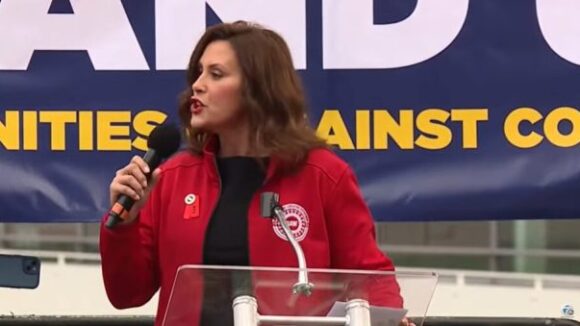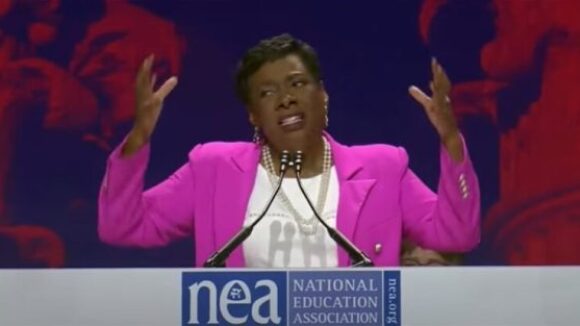Tyranny Triumphs in the Great Lakes State
Ignoring ample evidence of forced unionism’s unfairness and its damaging impact on jobs and incomes, Big Labor Michigan Gov. Gretchen Whitmer signed Right to Work destruction in 2023.
(source: National Right to Work December 2015 Newsletter)
Thanks to relentless grass-roots activism by members of the National Right to Work Committee, the number of congressional cosponsors of the forced-dues repeal legislation introduced in the Senate and House in early 2015 continues to rise.
S.391 and H.R.612, the national Right to Work measures respectively introduced in the 2015-16 Congress by Sen. Rand Paul (R-Ky.) and Rep. Steve King (R-Iowa), had a combined total of 127 sponsors as of December 1, when this Newsletter went to press.
These identical bills would not add a single word to federal labor law.
 Instead, they would simply repeal the current provisions in the federal code that authorize and promote the termination of employees for refusal to pay dues or fees to an unwanted union.
Instead, they would simply repeal the current provisions in the federal code that authorize and promote the termination of employees for refusal to pay dues or fees to an unwanted union.
“When S.391 or H.R.612 becomes law, private-sector employees in all 50 states will have the freedom to choose as individuals whether or not to join or bankroll a union,” explained Mary King, vice president of the National Right to Work Committee.
“No employees covered by federal labor statutes will face job loss as a consequence of their decision to refuse to pay dues or fees to a union they would never join voluntarily.”
Five Top-Ranking States For 2004-2014 Job Growth All Have Right to Work Laws
Compulsory unionism is, above all, a moral issue.
At the same time of all the economic reforms Congress may consider in 2016, federal forced-dues repeal, otherwise known as the National Right to Work Act, would surely have the strongest positive impact for jobs and incomes.
To illustrate the point, Ms. King called attention to the U.S. Commerce Department Bureau of Economic Analysis (BEA) data gauging private-sector employment growth in the 50 states over the past decade.
(Unlike the payroll jobs data reported by the U.S. Labor Department, BEA job statistics include self-employment, contractual employment, and employment at start-up businesses.)
“All of the five top-ranking states for 2004-2014 private-sector employment growth are Right to Work states,” said
Ms. King. “Meanwhile, all of the eight lowest-ranking states for private-sector job growth lacked Right to Work laws as of 2014.”
(Since Indiana and Michigan adopted Right to Work laws in 2012, they are excluded from this analysis. Since Wisconsin’s forced-dues ban was not adopted until this year, it is counted as a compulsory-unionism state here.)
Overall, BEA-reported private-sector, nonfarm employment in Right to Work states grew by 15.9% over the past decade.
That increase is 66% greater than the average for forced-dues states, and 37% greater than the national average.
But it’s not just employees and employers in states that lack Right to Work laws who are harmed by federally imposed compulsory unionism.
Compulsory Union Dues Bankroll Growth-Hindering Policies
“Union bosses funnel a huge portion of the forced dues and fees they collect with federal policy’s abetment into politics,” Ms. King pointed out.
“And the union-label politicians who routinely get elected and reelected because of their forced-dues-funded support overwhelmingly favor higher taxes and more red-tape regulation of businesses.
“This is true at the federal, state and local levels.
“The actions of forced-dues-funded politicians thus result in less job growth nationwide. Of course, Big Labor politicians do the most damage in states where union bosses rake in the most forced-dues money.
“But if Congress repealed all the forced-dues provisions in the National Labor Relations Act and the Railway Labor Act, this massive impediment to economic growth nationwide would be lifted.
“Forced-dues repeal would spur job growth in all 50 states.
“Businesses based in current Right to Work states would share the benefits as their major out-of-state suppliers and customers were freed from the burden of compulsory unionism.
“In 2016, the 2.8 million National Right to Work Committee members will continue encouraging Senate Majority Leader Mitch McConnell [R-Ky.] and House Speaker Paul Ryan [R-Minn.] to allow hearings, debate, and roll-call votes on S.391 and H.R.612.
“Freedom-loving Americans have a right to know exactly which federal politicians are willing to incur Big Labor’s wrath for the sake of ensuring that every worker can decide for himself or herself which union, if any, to support financially.
“Recorded Senate and House votes on the National Right to Work Act will accomplish that objective. And they will also be a significant step towards ultimate passage of forced-dues repeal.”

Ignoring ample evidence of forced unionism’s unfairness and its damaging impact on jobs and incomes, Big Labor Michigan Gov. Gretchen Whitmer signed Right to Work destruction in 2023.

Largely thanks to the Right to Work attorney-won U.S. Supreme Court decision in Janus v. AFSCME, union bosses like NEA President Becky Pringle are no longer able to block virtually all meaningful education policy reforms.

Avelo employee Kim Howard believes all the firm’s flight attendants should get to vote on continued AFA rule. Credit: WTNH-TV (ABC,…